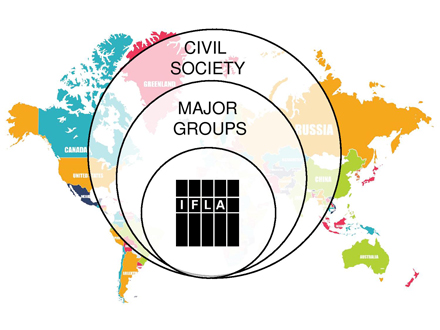Libraries, Advocacy and the Implementation of the 2030 Agenda
24 March 2016
 We are pleased to share a link to the archive and an excerpt of the online event “Libraries, Advocacy and the Implementation of the 2030 Agenda” which supports the new IFLA Toolkit, “Libraries and the Implementation of the 2030 Agenda.” IFLA Continuing Professional Development and Workplace Learning and the New Professionals SIG with the Management of Library Associations Section partnered with the American Library Association to present the one-hour webinar.
We are pleased to share a link to the archive and an excerpt of the online event “Libraries, Advocacy and the Implementation of the 2030 Agenda” which supports the new IFLA Toolkit, “Libraries and the Implementation of the 2030 Agenda.” IFLA Continuing Professional Development and Workplace Learning and the New Professionals SIG with the Management of Library Associations Section partnered with the American Library Association to present the one-hour webinar.
Libraries are extremely important for sustainable development, therefore it was of vital importance to present an online event featuring best practices and models to advocate for access to information. Additionally, we would like to emphasize the continuing professional development element included in staying up-to-date with these matters relevant to place libraries in the national development agendas. Continuing development is key to develop skills for increased advocacy and visibility in the local community so that libraries can succeed in implementing the need of access of information and develop towards the future.
The new toolkit launched by IFLA which will help you to advocate to your national and regional policy makers to make sure that libraries and access to information are included as part of national and regional development plans that will contribute to meeting the global 2030 Agenda. As these plans are developed, the library community in each country will have a clear opportunity to communicate to their government leaders how libraries serve as cost-effective partners for advancing their development priorities. Advocacy is essential now to secure recognition for the role of libraries as engines of local development, and to ensure that libraries receive the resources needed to continue this work. The process will be different in each country, and many have already decided how the UN Sustainable Development Goals (SDGs) will be implemented nationally. In order to help advocates, librarians and library associations show that they can drive progress across the entire 2030 Agenda, IFLA is encouraging all library advocates to take action now.
We invite our colleagues to listen to the recording of the webinar and see the presentation slides.
During the online event, Fiona Bradley, IFLA Manager of Development Programmes, discussed the new IFLA Toolkit. Although the process will be different in each country, the Toolkit will help those involved in national advocacy to:
- Understand the UN 2030 Agenda process, and IFLA’s advocacy
- Understand how the UN 2030 Agenda will be implemented at the national level
- Organise meetings with policymakers to demonstrate the contribution libraries and access to information make to national development, and across the SDGs
- Monitor the UN 2030 Agenda and implementation of the SDGs
- Tell library users about the SDGs
Niclas Lindberg, Secretary General of the Swedish Library Association and member of the Management of Library Associations Section, provided information about how their library association strategized positioning libraries on the agenda of decision makers in their country. Their model included advocacy to support access to information on the SDGs, communication and meetings with members of the government and elected officials, and ongoing engagement with officers coordinating the national development agenda advocacy.
Loida Garcia-Febo, IFLA Governing Board Member, coordinated the online event and shared a first-hand account of advocacy at the United Nations during the Working Open Group meetings and Intergovernmental Negotiations which were the participatory mechanisms followed by the United Nations to produce the final document with the SDGs. She emphasized the powerful role played by IFLA members and advocates worldwide collaborating as a global team united by a common goal.